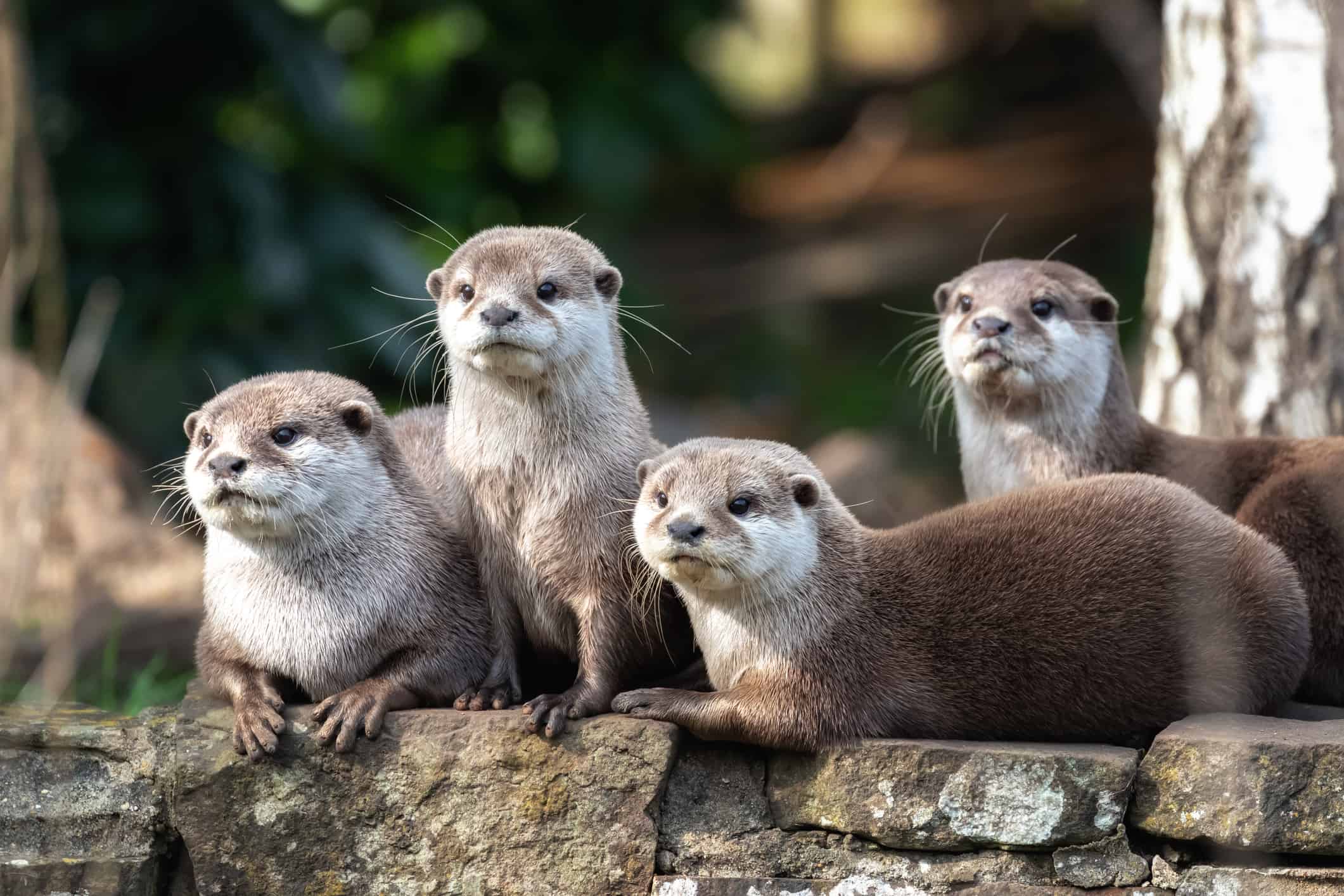Keeping an otter as a pet is generally illegal and highly discouraged. Otters require specialized care that is difficult to provide in a domestic setting.
Otters, with their playful demeanor and charismatic faces, may seem like tempting pets, but they are wild animals with specific needs that are challenging to meet in a home environment. They are often protected by conservation laws, making it illegal to own one without specific permits in most regions.
Owning an otter demands a vast knowledge of their diet, behavior, and habitat requirements — factors that contribute to their complex care. These aquatic mammals need constant access to water, not just for hygiene but for their mental and physical well-being. Many countries acknowledge the hurdles and ethical issues surrounding otter domestication by restricting or forbidding their ownership. Before considering an otter as a pet, potential owners must research local wildlife regulations and the extensive responsibilities involved in their care.
Otter Species And Pet Suitability
Various otter species exist, each with unique traits. The Asian Small-Clawed Otter is often spotlighted for its comparatively manageable size, yet it demands a specific and enriching environment. Prospective owners must grasp that irrespective of the species, otters exhibit a playful and energetic temperament, necessitating intricate care and social interaction.
Concerning temperament and behavior, otters are social and require constant companionship, exhibiting depression and anxiety if left alone. They are also known for their mischievous nature, capable of outmaneuvering inadequate containment efforts. Prospective owners should anticipate an otter’s need for stimulating activities.
Size and space requirements for otter habitats cannot be overstated. Ensuring a spacious aquatic environment is paramount, as otters are semi-aquatic and thrive in areas where they can freely swim and dive. A considerable land area must also be accessible for foraging and playing. Enclosures should mimic their natural habitat to the highest degree feasible, maintaining their mental and physical health.
Legal Implications Of Otter Ownership
Keeping an otter as a pet entails understanding the complex web of international and national regulations. Under the Convention on International Trade in Endangered Species (CITES), otters are protected due to their status as endangered or vulnerable species. To legally own an otter, obtaining a CITES permit is crucial, which often necessitates proving that the animal was not taken from the wild and that its ownership will not be detrimental to the survival of the species.
National laws can vary greatly, with some countries entirely banning otter ownership. Where allowed, the prospective owner must comply with wildlife trade regulations and endangered species laws. Within the United States, state and local permits for exotic animals like otters can be stringent, involving detailed applications and proof of adequate facilities and knowledge for otter care. It is advisable to thoroughly research and secure all necessary permits before considering an otter as a pet to ensure compliance and contribute to ethical wildlife stewardship.
Nutrition And Diet
Otters have specific dietary requirements that are crucial for their health and well-being. An otter’s diet largely consists of fish and crustaceans, which provide essential nutrients and energy. It is also beneficial for pet otters to consume a variety of foods, such as seafood, amphibians, and occasionally small mammals or birds. Providing a diet that closely mimics their natural food sources helps maintain their digestive health and nutrient balance.
Feeding a pet otter an inadequate diet can lead to serious health issues. A lack of proper nutrition may cause nutritional deficiencies or obesity, which can be detrimental to their health. Adequate amounts of calcium and taurine are crucial; failing to include these in an otter’s diet could result in poor bone formation and heart problems. Hence, it is imperative to ensure their meals are well-rounded and appropriate for their dietary needs.
Enrichment And Activity
Otters require a stimulating environment to stay healthy and happy in captivity. Providing a variety of enrichment toys and activities is essential for their well-being. Toys such as floating balls, puzzle feeders, and durable chew items can keep otters entertained for hours. Incorporating activities that mimic natural behaviors is also crucial, such as foraging games or habitat features that encourage digging and swimming. It’s important to rotate these items regularly to maintain the otters’ interest and prevent boredom.
| Toy/Activity Type | Benefit |
|---|---|
| Floating Balls | Mimics catching fish in the wild. |
| Puzzle Feeders | Encourages problem-solving skills. |
| Durable Chew Items | Supports dental health and jaw strength. |
| Foraging Games | Instills natural hunting instincts. |
| Habitat Enrichment | Promotes digging, swimming, and climbing. |
Regular interaction with caretakers is also key to an otter’s enrichment, as they are incredibly social animals that thrive on social bonds. Through smart and consistently varied enrichment strategies, pet otters can lead a more fulfilled and joyful life in a human care setting.
Health And Veterinary Care
Otters are considered an exotic pet and require specialized care, often facing unique health challenges. Common health issues in otters include dental problems, respiratory diseases, and obesity especially in captivities where their natural foraging behaviors are limited. Otters are also prone to heart disease and can suffer from zoonotic diseases, which are transmissible to humans. Special attention to their dietary needs is crucial in preventing nutritional deficiencies.
Finding a veterinarian with experience in treating exotic animals can be challenging, but it is essential for an otter’s wellbeing. Pet owners should seek out specialists prior to adopting an otter to ensure access to proper medical care. Adequate veterinary support should be seen as a non-negotiable aspect of responsible otter ownership. Always verify that the vet can perform a wide range of services, from routine check-ups to emergency care, tailored to an otter’s needs.
Wild Vs. Captivity
The concept of keeping an otter as a pet stirs up a significant ethical controversy, pitting the appeal of a unique companion against the responsibility to respect an animal’s inherent wild nature. Otters, with their playful antics and endearing behaviors, may seem like charming household members, but their needs are complex and tied to their free-roaming lives. Transforming a creature accustomed to wide-ranging habitats into a pet confines it to an unnatural, restrictive environment, which often leads to behavioral problems and psychological stress.
Additionally, the desire to own exotic pets such as otters impacts their numbers in the wild. Unsustainable demand for these playful mammals can contribute to the decline of their populations. Breeding and capturing otters for the pet trade disrupt natural ecosystems and can lead to species endangerment. As such, the decision to domesticate an otter is laden with significant conservation implications, prompting prospective pet owners to consider the broader consequences of their choices.
Adoption And Rescue
Adopting a rescued otter presents a unique opportunity to provide a second chance to these charismatic animals. Rescue organizations work tirelessly to rehabilitate otters that have been abandoned, injured, or otherwise in need of human care. It’s essential to acknowledge the significant commitment entailed in adopting a rescued otter. These creatures demand a considerable amount of attention, space, and expertise to thrive in a domestic setting.
| Responsibility | Details |
|---|---|
| Environment | Creating a habitat that simulates an otter’s natural environment, with access to water for swimming. |
| Diet | Ensuring a balanced diet that meets nutritional needs, which includes a variety of fish and seafood. |
| Enrichment | Providing mental and physical stimulation through toys and activities that encourage natural behaviors. |
| Veterinary Care | Regular check-ups with a vet who has expertise in exotic animals to maintain health and well-being. |
| Legalities | Understanding and complying with local, state, and federal regulations regarding otter ownership. |
Initial Setup Costs
Setting up a suitable environment for an otter involves considerable expenses. Prospective owners need to invest in a well-designed enclosure, often requiring custom construction to meet the otter’s needs for both land and aquatic spaces. The enclosure must be secure and spacious, with access to clean water for swimming, as otters are highly active and aquatic creatures.
Aside from the physical setup, there are legal considerations to address. Obtaining the necessary permits can be a complex process, involving both state and federal regulations. Legal fees can accumulate quickly, especially when navigating through the intricate requirements to legally keep an otter as a pet. Every aspiring otter owner must ensure they comply with the current wildlife and exotic animal regulations, which can vary widely by region.
Ongoing Expenses
Keeping an otter as a pet entails several ongoing expenses critical for their well-being. Key among these is the cost for food, which includes a diet rich in fresh fish and specialized pet feeds, representing a significant portion of the monthly budget. Healthcare expenses are another substantial aspect, requiring regular veterinary check-ups and vaccinations to ensure the otter’s health and longevity.
Enrichment items are necessary to simulate a natural environment, which keeps the otter mentally and physically stimulated. These can range from water features to chewable toys. Moreover, the costs associated with unexpected care needs can arise without warning, necessitating an emergency fund for unforeseen health issues or accidents, which could impose stress on a pet owner’s finances.
Real-life Otter Owner Experiences
Becoming an otter pet owner brings a unique set of joys and challenges. Several individuals who have embarked on this journey report that otters exhibit genuine affection and playfulness which can be immensely rewarding. Otters often form strong bonds with their owners, following them around and seeking constant interaction. These furry companions require plenty of stimulation and attention, and owners find delight in their intelligent antics.
However, otter owners also face numerous obstacles. Otters are naturally wild animals with a tendency for destructive behaviour if not provided with an appropriate environment. They need large, specialized habitats that mimic their natural surroundings, which can be both costly and space-consuming. Dietary needs are specific and preparing feeds can be time-consuming. Legal restrictions also pose a significant barrier, as otters are protected species in various regions, requiring special licenses to keep them as pets.

Credit: a-z-animals.com
Frequently Asked Questions For Can You Keep An Otter As A Pet
Is An Otter Legal As A Domestic Pet?
Otters are not legal as pets in most areas. They often fall under wildlife and exotic animal regulations which prohibit or tightly control their ownership. Hence, checking local regulations is crucial before considering an otter as a pet.
How Much Does It Cost To Own An Otter?
Owning an otter can be quite expensive. Initial costs for a captive-bred otter can range from $1,000 to $5,000. Additional expenses include a suitable aquatic habitat, a specialized diet, and ongoing veterinary care, which can be substantial.
What Care Do Pet Otters Require?
Pet otters require extensive care, including a large, secure enclosure with ample water for swimming. They need a diet of fresh fish and special enrichment to satisfy their need for mental stimulation and physical activity.
Can Otters Be House-trained Like Dogs Or Cats?
Unlike traditional pets, otters are challenging to house-train. Their natural behaviors and marking tendencies can make domestic life difficult. Specialized training is required, and success varies greatly among individual otters.
Conclusion
Embracing the dream of having an otter as a pet requires extensive research and commitment. Ensure your lifestyle aligns with the complex needs of these playful creatures. Remember, while otters are enchanting, their well-being and legal considerations must always come first.
Seek alternatives that support otter conservation efforts, and cherish these delightful animals from a responsible distance.

